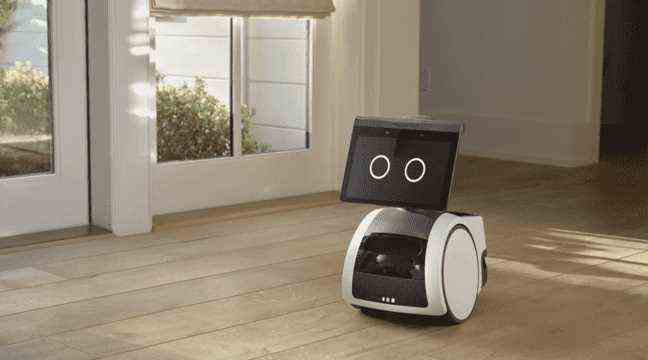It’s a little Alexa on wheels. On Tuesday, Amazon unveiled Astro, its first robot-assistant for the home, capable of detecting intruders or checking to see if granny is okay. And if this type of companion could prove to be very useful, former engineers involved in the project have denounced a “nightmare for privacy”.
The roller craft can map a house and respond to voice commands to point its camera in one room or another. He can also recognize faces, learn the habits of household members and remind everyone of their activities. Video conferencing is obviously on the program with a 10-inch screen which also gives the robot its personality, with emotions conveyed by its eyes and nods.
60 centimeters high and weighing less than 10 kilos, it will cost 1,000 dollars in the United States at first – for a few users chosen by Amazon – then around 1,450 dollars.
“When you’re outside the home, you can use it to patrol your home,” Dave Limp, an Amazon vice president, said in the promotion video released Tuesday. Astro could also be used to check that all is well with elderly relatives, with its periscope camera. “It’s science fiction come true,” said Suri Maddhula, who worked on the project, in the Amazon video.
“Nightmare for privacy”
During a press conference, Dave Limp wanted to be reassuring. He said users can lock the lenses and microphones of the robot, which makes sounds and displays messages if someone tries to hack it. He also claimed that Amazon did not have access to Astro’s remote cameras, and therefore “could never give this access to the police or emergency services.”
“In some scenarios, such a home surveillance camera can be useful,” said Matthew Guariglia, an analyst with the NGO Electronic Frontier Foundation, which defends human rights online. But he points out that the device could also serve as a Trojan horse for hackers or the police.
Former employees have also disclosed internal documents to the Motherboard site detailing the Sentry surveillance system, which records an astronomical amount of data and automatically activates if the robot does not recognize a person after 30 seconds. According to them, the facial recognition system has big failures, and Astro promises to be a “nightmare for privacy”. They finally predict that the robot, despite a function supposed to prevent it, “is sure to tumble down stairs.”

